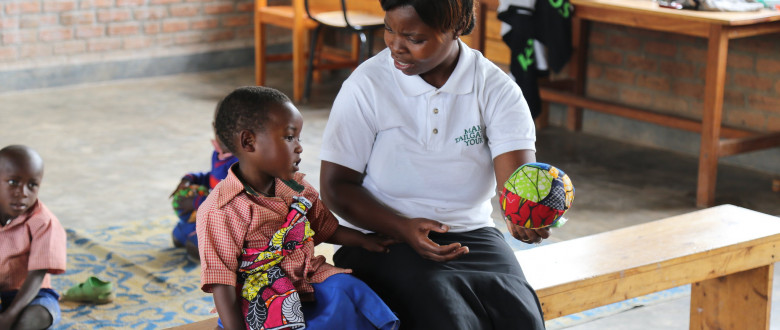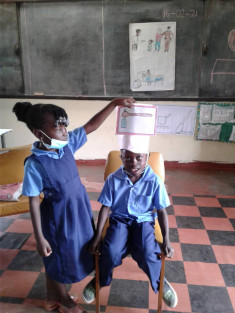
Learning through Play is still too absent from many early childhood classrooms (ECE) in Africa, despite research showing the approach’s importance for building foundational skills. As a next step in the partnership between VVOB and the LEGO Foundation, the IT’S PLAY project works with teachers to bring playful learning into ECE classrooms in Zambia, Rwanda and Uganda.
Read up on all the technical details of IT’S PLAY in this factsheet
School readiness
Young children are finding their way to preschool in countries across Eastern and Southern Africa (ESA). That is great news, because early childhood education (ECE) sets the wheels of our academic journeys in motion. So why are many children in grades 2 and 3 of primary education still not able to read, write, or do basic maths operations?
Access is one important hurdle jumped, quality is the next. As it stands, ECE in the ESA region is often characterised by teacher-centred instruction and rote learning, and is focused on early acquisition of academic skills. Children of ECE age are simply not ready for this type of teaching, and are thus missing opportunities to develop the emergent literacy and numeracy skills they need to start reading, writing and doing maths in primary school.
Learning through Play (LtP), on the other hand, does foster the holistic skills that define (primary) school readiness: physical, socio-emotional, language and cognitive skills, self-regulation, creativity, etc. LtP pedagogies also stimulate the development of emergent literacy and numeracy skills at the level of the child. But while it is – at times – part of official ECE policy, LtP pedagogies remain misunderstood, mistrusted, and thus absent from the classroom in practice.
With IT’S PLAY, the LEGO Foundation and VVOB are supporting school leaders, teachers, parents and governments in Zambia, Rwanda and Uganda to move towards more playful ECE classrooms and give their youngest learners a real head start.
The fine print
The IT’S PLAY project focuses specifically on strengthening teachers’ play facilitation skills in order for them to better support the development of literacy and numeracy in ECE learners. By introducing new ways of working at classroom level, IT’S PLAY catalyses change to how children learn at national level and in the community in Zambia, Rwanda and Uganda.
While the country contexts and levels of scale vary, VVOB applies a similar approach in all three partner countries: the used teacher professional development (TPD) model combines elements of the ‘emergent curriculum model’ and the ‘prescriptive model’ for building play facilitation skills at scale (the LEGO Foundation, Jensen et al., 2019). Through in-service teacher training providers, teachers have access to content-specific and high-quality descriptions of play-based learning activities for emergent literacy and numeracy.

An example of such a playful learning activity is ‘Whats-on-the-hat’ (right). For this activity, a child sticks a picture of an object on their hat and asks the other learners questions in order to guess the object on their hat. This is an easy and fun way to encourage and strengthen children’s speaking skills and vocabulary.
A second important aspect to the TPD approach is the support to teachers to actively observe their learners and reflect on their own teaching.
Working simultaneously ‘top-down’ and ‘bottom-up’, IT’S PLAY exposes ECE teachers, parents, government officials and all other education stakeholders to the value and importance of play for learning.
IT’S PLAY is funded by the LEGO Foundation’s Play Our Part Initiative (POP). As part of the POP Initiative, the LEGO Foundation has created a Community of Practice in which the LEGO Foundation, VVOB, Innovations for Poverty Action (IPA), VSO and Plan International jointly test and refine approaches to strengthen LtP quality and reflect on and share learnings to contribute to building evidence and inform the ECE community.
Header picture: ©GPE/Alexandra Humme. VESTINE NYIRAZUBA, pre-school teacher in her classroom at the Jean de la Mennais School in Burera district in rural Rwanda; teaching a student




